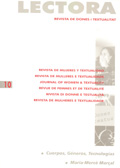Cuando Frankenstein encontró a Dorian Gray: dandysmo, post-identidad y sujetos virtuales
Resum
The appearence and popularization of the Internet has created new forms of writing, that compel us to think anew about identity and subjectivity. Webjournals or blogs are specially interesting because they are a massive phenomenon that uses autobiographical writing in a peculiar way. These forms of writing stress a traditional paradox of the genre: the coexistence between a purpose of private, confessional and spontaneous writing and a public image, carefully built, as a result of its writing. The technology is new, but, in fact, the paradox is old. This paper tries to explore this old paradox, our eternal condition of cyborgs, our use of technologies in order to construct a public, unique and recognizable identity. In order to do so, I will try to show the virtual condition of any written individual "this issue has already been dealt with by autobiographical studies", focusing on blogs, and especially on concrete example (Lord Whimsy's Journal). I will pay attention to gender as a technology that constructs identity and, at the same time, is deconstructed by the autobiographical narratives analyzed. In short, I attempt to show that virtual and autobiographical discourse do not bring forth a new kind of subject but the permanence of an old phenomenon "clearly developed by dandyism, for instance": the use of technologies to re-invent, re-formulate and re-construct us as multiple, hybrid and mixed subjects.Descàrregues
Publicades
Com citar
Número
Secció
Llicència
Els autors i les autores conserven els drets d’autoria i atorguen a Lectora: revista de dones i textualitat el dret de difusió. L'’obra serà disponible simultàniament sota una Llicència de Reconeixement-NoComercial- SenseObraDerivada de Creative Commons que, si no si indica el contari, permet compartir l’obra amb tercers, sempre que aquests en reconeguin l’autoria i la publicació inicial en aquesta revista.
Els autors i autores són lliures de fer acords contractuals addicionals independents per a la distribució no exclusiva de la versió de l’obra publicada a la revista (com ara la publicació en un repositori institucional o en un llibre), sempre que se’n reconegui la publicació inicial en aquesta revista.
S’encoratja els autors i autores a reproduir la seva obra en línia (en repositoris institucionals, temàtics o a la seva pàgina web, per exemple), amb l’objectiu d’aconseguir intercanvis productius i fer que l’obra obtingui més citacions (vegeu The Effect of Open Access, en anglès).




